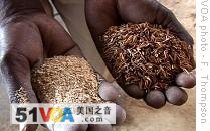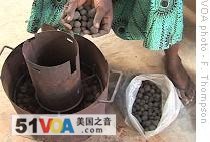Dakar
21 April 2009
Researchers in Senegal have created what is described as a clean substitute for charcoal that not only helps protect the environment, but costs far less. The alternative fuel has just gone on sale in the markets of northern Senegal.
 |
| Rice husks are mixed with clay to make green charcoal, an alternative to traditional black charcoal, in northern Senegal |
But unlike it's darker cousin, green charcoal is efficiently produced, burns cleanly and is made from renewable local materials.
This innovative product was developed by the French environmental NGO ProNatura International. It is expected to be available soon in Mali, Niger, Madagascar, China, India and Brazil using such diverse raw materials as cotton stems, peanut shells and coffee bean husks.
"What's really new is our technology - it's groundbreaking - because we are the only ones having developed the technology where the machines run on a continuous basis," said Guy Reinaud, director of ProNatura International. "Normally when you carbonise material you use a batch process like the one used for producing charcoal. But if you apply that simple technology to biomass - to reeds or rice husks - the efficiency is very low."
Now, after 14 years of research and development, green charcoal is on sale for the first time in Senegal's northern region of St. Louis, an area where traditional charcoal is hard to come by.
Abdoulaye Fall, manager of the green charcoal factory in Ross-Bethio, 25km from the Mauritanian border, says they make the green charcoal with rice husks because there are many rice mills in the area that throw out the husks. Ross-Bethio is also an area with clay soil, so that's the binding agent. Fall says the raw materials are virtually free.
 |
| Fatou Camara, 45, cooks with green charcoal in an improved stove |
Ibrahima Niang, a renewable and sustainable energy specialist at Senegal's Ministry of Energy, says the main problem with charcoal consumption is deforestation. Imagine, he says, that you must cut down five kilos of wood to produce only one kilo of charcoal. Thirty years ago charcoal came from only 70 km outside of Dakar, now you must go hundreds of kilometers to find a forest.
The U.N. food and agriculture agency says 45,000 hectares of forest disappear every year in Senegal.
In Ross-Bethio there are few trees and traditional charcoal is trucked up from southern Senegal. So green charcoal could be a welcome alternative for many cash-strapped households. One kilo of green charcoal costs just 20 cents, whereas a kilo of black charcoal is three times as much.
Mame Diop Mbaye runs the bustling Yayu Seex restaurant in the center of town that serves lunch to rice factory workers. She cooks on three huge pots boiling over charcoal stoves. Mbaye says the green charcoal works for her because it cooks quickly and the food tastes good. It takes less than an hour to make a meal. Sometimes, she says, she adds some black charcoal because it makes the green charcoal last longer.
Fatou Camara cooks for her family of 10 with the green charcoal briquets. She says the green charcoal is more economical because one kilo will cook a whole dinner. And it is cheaper than normal charcoal. She says she used to use butane gas, but with gas being so scarce, she switched to green charcoal.
Reinaud says using green charcoal fights climate change because it reduces emissions and cuts back on deforestation. The project aims to prevent 1,400 tons of carbon dioxide equivalent from spilling into the atmosphere every year.